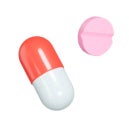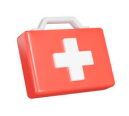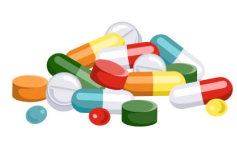Uses
What is Cimetidine for?
Cimetidine works by reducing the amount of acid produced in the stomach. It is used to treat various conditions of the gastrointestinal tract (stomach and intestines) including:
- Gastro-esophageal reflux disease (a condition where the acid from the stomach goes back up the food tube and throat, causing pain and a burning sensation known as heartburn)
- Treating and preventing ulcers of the gastrointestinal tract
How should I take or use Cimetidine?
- This medication should be taken orally.
- If you have been instructed to take this medication regularly, do not stop taking it without checking with your healthcare professional.
- You may take this medication with food.
What should I do if I forget to take or use Cimetidine?
If you forget to take a scheduled dose, take it as soon as you remember. Then take your next dose at the usual time. Do not take two doses to make up for the missed dose.
Precaution
What precautions should I take when taking or using Cimetidine?
Inform your healthcare professional if:
- You are allergic to this medication or any of the other ingredients of this medication.
- You are pregnant, planning to become pregnant, or breastfeeding.
- You have a history of liver and/or kidney disease.
- You have been diagnosed with a rare inherited disease known as porphyria. This condition affects the production of red blood cells.
- You are taking any other medications, including supplements, traditional medications and herbal remedies.
What food or medication should I avoid when I take or use Cimetidine?
This medication may decrease the absorption of several vitamins and minerals such as:
- Vitamin B12
- Magnesium
- Iron
Speak with your healthcare professional to determine if you need to supplement these vitamins and minerals.
This medication interacts with many types of long-term medications. This may result in more side effects from your long-term medication, or may make other medications less effective. Medications affected by cimetidine include but are not limited to:
- High blood pressure medication e.g. Nifedipine
- Medications for your heart e.g. Metoprolol, Amiodarone, Flecainide
- Medications to treat fungal infections e.g. Ketoconazole, itraconazole
- Medications to thin the blood e.g. Warfarin
- Medications to stabilize mood e.g. Amitriptyline, Diazepam
- Medications to treat seizures e.g. Carbamazepine, Phenytoin
- Medications to suppress the immune system e.g. Tacrolimus, Cyclosporine, Hydroxychloroquine
- Medications for migraine e.g. Cafergot
Inform your healthcare professional if you are taking or intend to take any other medications, supplements, traditional medications or herbal remedies.
Side Effects
What are some common side effects of Cimetidine?
-
Side effects of cimetidine include stomach pain, constipation, nausea, headaches and rarely blurred vision.
- Please consult your healthcare professional if the symptoms do not go away or when any unexplained or unusual symptoms occur.
What are some rare but serious side effects that I need to seek medical advice immediately?
The symptoms of a drug allergy include one or more of the following:
- Swollen face/eyes/lips/tongue
- Difficulty in breathing
- Itchy skin rashes over your whole body
Signs that your condition may require further medical attention include:
- Shortness of breath or wheezing
- Having a hoarse voice
- Having signs of teeth erosion such as changes in teeth color, sensitivity to certain foods or edges of your teeth becoming rough
- Having signs of an ear infection such as fever, pain in your ear or discharge flowing out from your ear
- Pain when swallowing, difficulty in swallowing
- Blood in the stools (black and sticky stools)
- Vomiting blood or black material
- Chest pain
- Unintended weight loss
- Jaundice (yellowing of the skin and whites of the eyes)
- Heartburn symptoms occurring for more than 3 times a week with serious impact on your quality of life
- Heartburn symptoms continuing for more than 2 weeks despite self-treatment
- Heartburn symptoms continuing for over 3 months despite self-treatment
- You are over 40 years old and experiencing heartburn symptoms for the first time
If you experience any of the symptoms mentioned above, you should stop your medication and see your healthcare professional immediately.
Handling
How should I store Cimetidine?
Store in a cool and dry place, away from direct sunlight. Keep this medication away from children.
How do I throw away Cimetidine safely?
Pack this medication into a black trash bag and seal it tightly before throwing into the rubbish chute or bin.
Disclaimers
This article is jointly developed by members of the National Medication Information workgroup. The workgroup consists of cluster partners (National Healthcare Group, National University Health System and SingHealth), community pharmacies (Guardian, Unity and Watsons) and Pharmaceutical Society of Singapore. The content does not reflect drug availability and supply information in pharmacies and healthcare institutions. You are advised to check with the respective institutions for such information.
The information above is solely for informational purposes only and is not intended as a substitute for the advice provided by your physician, pharmacist or other healthcare professional. You should not use the information for diagnosing or treating a health problem or disease, or prescribing any medicine or other treatment. Always speak with your physician, pharmacist or other healthcare professional before taking any medicine or supplement, or adopting any treatment for a health problem. Under no circumstances will the National Medication Information workgroup be liable to any person for damages of any nature arising in any way from the use of such information.
Last updated n December 2023

Need More Medicine?
Use Medicine Order Service on HealthBuddy.

Medicines Reminder
Get reminders and chart progress on HealthBuddy.




















